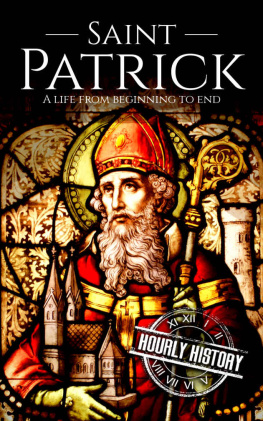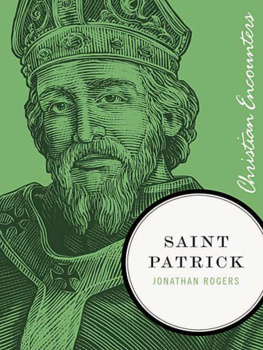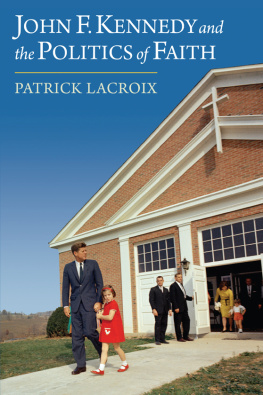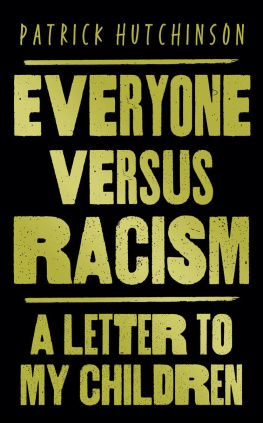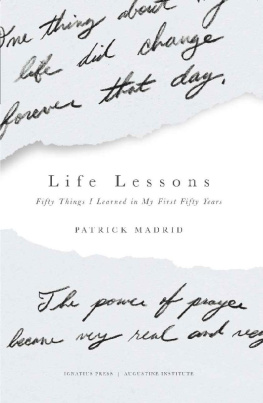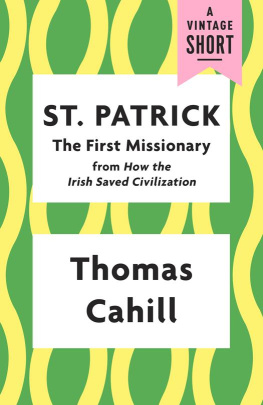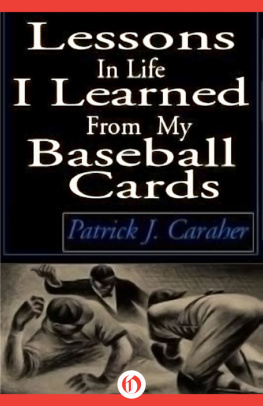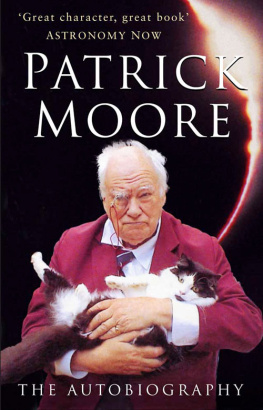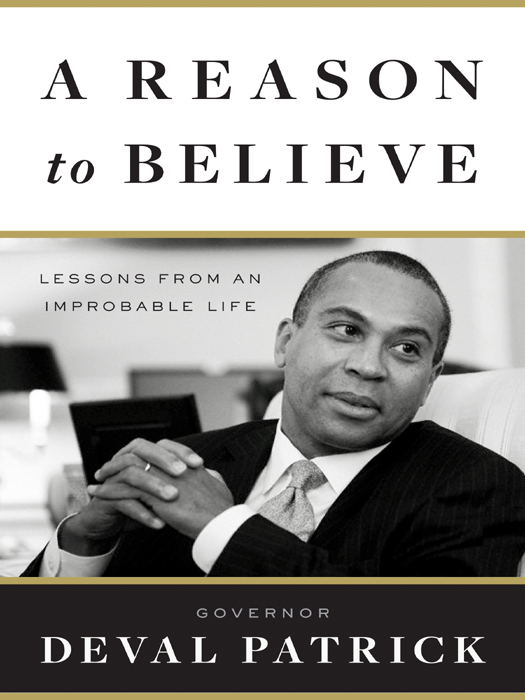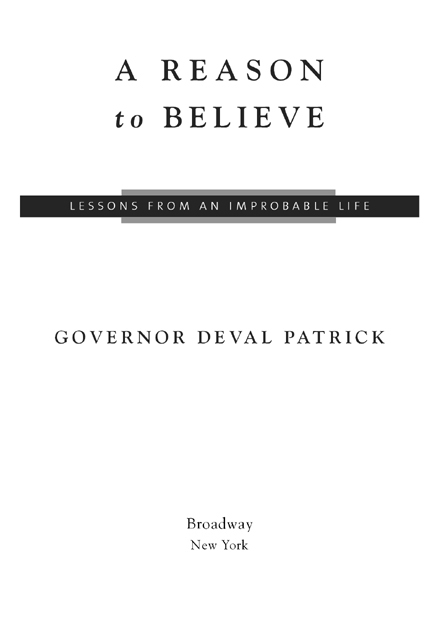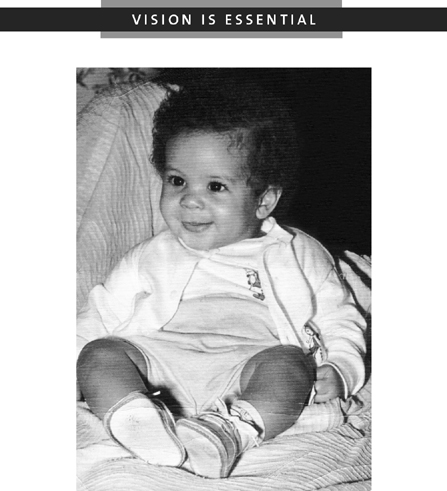
Copyright 2011 by Deval L. Patrick
All rights reserved.
Published in the United States by Broadway Books,
an imprint of the Crown Publishing Group,
a division of Random House, Inc., New York.
www.crownpublishing.com
BROADWAY BOOKS and the Broadway Books colophon
are trademarks of Random House, Inc.
Library of Congress Cataloging-in-Publication Data
Patrick, Deval.
A reason to believe : lessons from an improbable life / by Deval Patrick.
1. Patrick, Deval. 2. GovernorsMassachusettsBiography.
3. African American governorsMassachusettsBiography.
4. MassachusettsPolitics and government1951
5. LawyersUnited StatesBiography.
6. Chicago (Ill.)Biography. I. Title.
F71.22.P37A3 2011
974.4044092dc22
[B]
2010021528
eISBN: 978-0-307-72076-4
Jacket design by Darren Haggar
Jacket photography by Rick Friedman/Corbis
v3.1
To Diane, Sarah, and Katherinemy treasures
CONTENTS
PREFACE
Once, when I was fifteen, I had to catch a bus to meet a friend, and I was running late. We lived on the South Side of Chicago, near the corner of 54th Street and Wabash Avenue, so I raced south down Wabash past the white-walled commercial bakery that always smelled of sour yeast, across the weed-filled median on Garfield Boulevard, and east down a block past the liquor store, the Laundromat, and the shop that sold live chickens to housewives. The shopkeeper could slaughter the bird or the women could do it themselves at home.
I reached the bus stop just as the familiar green and white CTA bus pulled up, oily and wheezing. I climbed the steps, reached for my coins, and only then realized that I did not have enough for the fare. The driver, a world-weary black man with a gray grizzle and salt-and-pepper mustache, had already jerked the bus into gear and started down the street. He gave me a withering look and told me gruffly to sit down, pointing to a seat close to the door. I obeyed.
I braced myself for a stern lecture on the futility of trying to pull a fast one, and I assumed he would kick me off at the next stop. My mouth was suddenly dry, my stomach churning. Embarrassed and stammering, I stood again and started to explain that I had been away (I was a sophomore at a boarding school in New England) and did not know the fare had changed. He looked me over with the sure gaze of a man who had heard every excuse and was practiced in sizing up passengers. He turned his eyes back to the road. His expression abruptly softened.
Its okay, he said. Just pass it on, son. Pass it on.
I thanked him and sat back down heavily, overwhelmed. Expecting humiliation, I instead received a simple act of grace, and for whatever reasonperhaps just the kindness in the face of certain reprimandthat moment left a lasting impression. It was a reminder that I should do for others what he had done for me.
Nearly forty years later, I can reflect on what a blessing it has been to encounter so many people who chose to help someone in neednot because they had to but because they simply could. They showed mercy or compassion, and through their action taught a lesson. Sometimes these deeds, bold in their scope and lofty in their ambition, create headlines. More often, they are performed anonymously, quietly, reaching no further than the heart they were intended to touch. In whatever form, such acts create their own legacy of hope and inspiration. They pass something on. This book is my effort to share some of the lessons that have imbued me with core values, shaped my identity, and made me want to be a better man.
My life is often described as improbable. Because I grew up in a broken home and in poverty, my academic career at Harvard College and Harvard Law School is sometimes called improbable. My legal career, which included winning an argument before the U.S. Supreme Court and suing an Arkansas governor named Bill Clinton, who later appointed me assistant attorney general for civil rights, is called improbable. My corporate career, which included service as a senior executive at two of the most highly recognized companies in America, Texaco and Coca-Cola, is called improbable. My political career is described variously as improbable or impossible: In my first race for elective office, lacking name recognition, connections, and money, I became the first African-American governor in the history of Massachusetts.
Of course, I acknowledge the unlikelihood of my good fortune. I also recognize the hard work and discipline that have made it possible. But above all I cherish and celebrate the many people who have taken moments to enlighten me, to renew my ideals, and to spur me to action. There have been teachers and preachers, supervisors and colleagues, friends and family. There have also been strangers, many strangerswhether on a dairy farm in Massachusetts or in the sands of the Nubian Desertwho through their words or deeds have delivered transcendent messages about life, faith, and friendship. I have always tried to listen. And they have made all the difference.
This book is a tribute to them. It is an effort to distill some of the many lessons that have made me the idealist I am and to convey them in a way that is meaningful and lasting. My journey is far from over. There are lessons yet to learn. But my experiences have been rich, giving me a broad window into the lives of others, and I believe these experiences offer a guiding light for other seekers. Thats a bold statement, but its grounded in a truth taught by my improbable life: Each of us, from the mightiest to the meekest, has the capacity to teach, inspire, and ennoble.
Pass it on.
Chapter 1
In 1999, in a weekly meeting of the five most senior executives at Texaco, our boss, the chief executive officer, asked whether the company lacked vision. The global energy industry was in the midst of great consolidation, with legendary giants merging and famous brands disappearing. I was a relative newcomer to this world, and it felt like a game of billion-dollar musical chairs played around the circular table of a plush, walnut-paneled conference room. We sensed we were losing, and I was surprised by the muffled response to the bosss question. If there was a vision for the company beyond just making money, no one in that room knew what it was.
The moment resonated with me for a different reason. According to scripture, Without a vision, the people will perish. I knew that lesson well.
Growing up with no money, I knew my family had a simple vision: to no longer be broke. Though we occasionally lived from hand to mouth, my grandmother hated for us to describe ourselves as poor. Were broke, she declared. Broke is temporary. Splitting rhetorical hairs seemed odd when we were hungry. But my grandmothers message conveyed a much larger truth, especially in that place and in those times. She taught us to imagine a life that was better than or different from our own and then to work for it.
The South Side of Chicago was like a small southern town in the 1950s and 60s. Many of the inhabitants were recent arrivals from down home, as they called itthe cotton fields of Mississippi and Georgia, the tobacco fields of the Carolinas, or the railroad yards of Arkansas and Louisiana.


